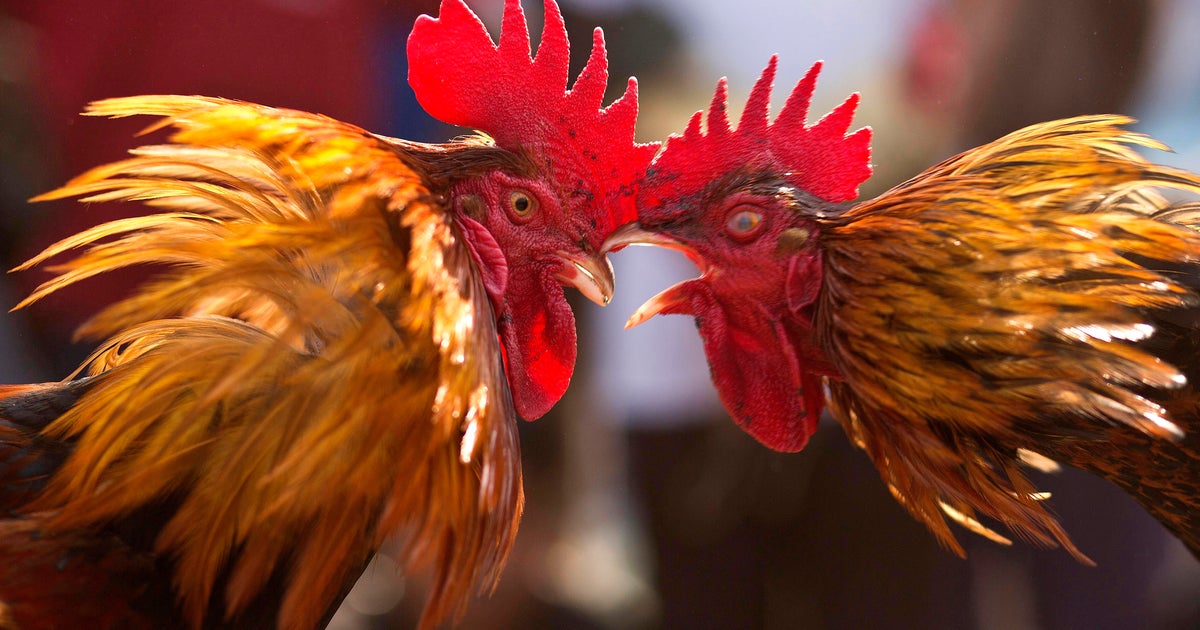CBS News
Cockfighting opponents in Oklahoma worry support is growing for weakening the state’s ban on the bloody sport

Before Oklahoma became one of the last places in the U.S. to outlaw cockfighting in 2002, it wasn’t uncommon to see hundreds of spectators packed into small arenas in rural parts of the state to watch roosters, often outfitted with razor-sharp steel blades, fight until a bloody death.
More than 20 years after the ban took effect, some worry Oklahoma is starting to waver.
A proposal to weaken cockfighting penalties cleared the Oklahoma House. A political action committee is raising money to support farmers who raise game fowl. And in a video since pulled from YouTube, Republican Gov. Kevin Stitt recorded a message supporting the group known as the Oklahoma Gamefowl Commission, saying he would “cheer you on from the sidelines.”
“They’ve tried to make an official sounding name,” said Wayne Pacelle, president of Animal Wellness Action, which two decades ago worked to turn out Oklahoma voters and outlaw the activity. “But they’re just a bunch of cockfighters.”
He said before the ban, rural Oklahoma counties were peppered with cockfighting arenas set up in large barns with stadium-style seating, overhead lights and even concession stands. Events attracted hundreds of spectators, even children and families. After a major event, it wasn’t uncommon to see the property littered with dead bird carcasses after fights to the death.
“We went from 42 arenas, to… maybe there are 10 or 15 pits in the state,” he said.
The reemergence of cockfighting as an issue in the Oklahoma Capitol is frustrating opponents who, until recently, considered the matter long settled. Rooster fighting is illegal at the federal level, punishable by up to five years in prison for some offenses. But a spate of recent cockfighting-related arrests in both Oklahoma and elsewhere is also a reminder that the practice has not been eliminated so much as driven underground.
Police in Hawaii have vowed to step up enforcement after one of the most serious mass shootings in that state’s history happened last year at a cockfight where five people were shot, including two who died.
For his part, Stitt said he records dozens of videos each week and didn’t give his participation much thought. “Of course, I’m not for gamecock fighting in the state of Oklahoma,” he told The Associated Press. But he also suggested he is open to reducing penalties if the state’s GOP-controlled Legislature sends him a bill.
The video unleashed bipartisan blowback across Oklahoma, including from former Gov. Frank Keating, a fellow Republican. Oklahoma football legend Barry Switzer — whose nickname in the state is simply “The King” after winning three national championships and a Super Bowl with the Dallas Cowboys — also came after Stitt.
But the backlash doesn’t faze Anthony Devore, head of the Gamefowl Commission, who says his organization has 15,000 members and described them as mostly hard-working rural Oklahomans. His group has raised more than $70,000 to lobby lawmakers and is seeking to replicate the same model in several other conservative Southern states, including in Alabama, Arkansas, Kentucky and Mississippi.
Devore said he and others raise the birds to participate in poultry shows and sell them as breeding stock overseas. While cockfighting is illegal in many countries, it remains legal and popular in some Mexican states, the Philippines and some countries in southeast Asia.
“We represent game fowl farmers who breed and raise game fowl, but not for fighting purposes,” said Devore, himself a game fowl breeder.
But Devore acknowledged a former district director for his organization who has since resigned was arrested and charged with facilitating a cockfight after authorities in Carter County raided a cockfighting pit with more than 100 people in attendance. That criminal case is pending.
Devore and other members acknowledge they’re operating in a gray area of the law and say reducing the penalties would remove the fear of felony criminal charges hanging over their heads.
The effort is welcome news to Troy Thompson, a former high school teacher and coach who now works full-time raising thousands of birds every year on his 55-acre ranch dotted with white, tent-like structures near the town of Wilson in far southern Oklahoma, just 30 miles north of the Red River border with Texas.
Thompson, 50, said the chickens on his farm, who are kept on foot tethers so they don’t fight with one another, are given vitamins, green grass year round and the highest quality feed he can buy. He said his chickens have a much better life than they would on a typical poultry farm, where they’re raised in a tiny cage and slaughtered at about six weeks old.
“I had a rooster pass away last week that was 10 years old,” he said. “They have a lot better life living here than they’re going to have on a Tyson poultry farm.”
Thompson said he grew during a time when rooster fighting was legal and dozens of farms dotted the rolling hills of southern Oklahoma. The name of his boyhood T-ball team was the Dillard Fighting Cocks.
“Would that go over today?” he asked. “It’s mind blowing that you went from perfectly legal to facing a 10-year prison sentence.”
And while some law enforcement officers and prosecutors have been cracking down recently on those who raise and fight birds, with busts recently in both urban and rural communities, prosecutors say it’s unlikely anyone has been sentenced to prison for cockfighting.
“I would say there’s probably almost none (in prison),” said Greg Mashburn, the top prosecutor for three central Oklahoma counties. “In the 18 years I’ve been DA, we’ve only had two cases.”
Still, Mashburn said it’s important to enforce anti-cockfighting laws because there is often a criminal element engaged in the activity that often involves illegal drugs and gambling.
“It’s also cruel to the animals,” Mashburn said. “And where do you draw the line? If we allow that with chickens, why not dogs or other animals fighting to the death?”
Still, some animal rights supporters say other local sheriffs and prosecutors often turn a blind eye to the practice. Although the cockfighting ban passed in 2002 with 56% of the vote, 57 of the state’s 77 counties were in favor of keeping cockfighting legal.
Drew Edmondson, a former county prosecutor and attorney general for Oklahoma, now serves as a law enforcement co-chair for Animal Wellness Action. He said it’s easy to understand why some elected officials in Oklahoma, even sheriffs, might look the other way when it comes to cockfighting.
He called it a combination of money and politics.
“For local politicians, it’s a pretty easy call when 60, 70, 80% of their county voted ‘no’ on the issue, to soft pedal it and not treat it like a serious crime,” he said.
CBS News
House Ethics Committee quietly voted to release Matt Gaetz ethics report

Washington — The House Ethics Committee has quietly voted to release its report on the investigation into former Rep. Matt Gaetz regarding allegations of sexual misconduct and obstruction, two sources familiar with the matter said, reversing course after Republicans originally blocked its release.
The report will likely be unveiled in the coming days, after the final votes of the 118th Congress, the sources said. Lawmakers face a Friday deadline to approve new government funding and avoid a shutdown before heading home for the holidays. CNN first reported on Thursday that the committee voted behind closed doors to release the report earlier this month.
House Republicans recently blocked two Democratic resolutions that would have compelled the Ethics Committee to release the potentially damaging report on its investigation into Gaetz, voting to refer the matter back to the committee.
Gaetz resigned from Congress shortly after President-elect Donald Trump said he planned to nominate Gaetz to be attorney general in November. But Gaetz soon withdrew from consideration, facing a likely contentious confirmation process. Gaetz has said he does not intend to take the oath of office for the same seat in the 119th Congress, and is launching a new show on the pro-Trump One America News Network in January.
It’s highly unusual, but not unprecedented, for the House Ethics Committee to release a report on a member who is no longer in office. Congressional leaders, including some Democrats, have expressed concerns about the precedent set by unveiling the Gaetz report.
In June, the committee released a statement saying it was investigating allegations against Gaetz that included sexual misconduct, illicit drug use, and bribery.
Multiple sources at the time told CBS News that four women had informed the Ethics Committee that they had been paid to go to parties that included sex and drugs, and that Gaetz had also attended. The committee has Gaetz’s Venmo transactions that allegedly show payments for the women.
Gaetz has repeatedly denied wrongdoing and has called the committee’s investigation a “frivolous” smear campaign.
Some of the sexual misconduct allegations under review by the committee were the subject of a previous Department of Justice probe into Gaetz. Federal investigators sought to determine if Gaetz violated sex trafficking and obstruction of justice laws, but no charges were filed.
CBS News
Grateful Dead’s legacy takes center stage at Kennedy Center Honors

Watch CBS News
Be the first to know
Get browser notifications for breaking news, live events, and exclusive reporting.
CBS News
Monkeys spotted roaming Florida city as police issue warning

Monkeys have been spotting roaming in unusual places in central Florida recently — and the police are warning residents to stay away.
The Orange City Police Department said on social media that it had received “multiple reports of monkey sightings” in the town, which is in Volusia County. People who see monkeys should not feed or approach them, the department said, but should contact the Florida Fish and Wildlife Conservation Commission.
A viral video from a river near Orange City, taken by a river tour operator, shows a monkey hanging out on a wooded bank.
“I looked up into a tree and kind of went, ‘What’s that!?'” Colin Innes of St. John’s River Eco Tours, told CBS affiliate WKMG. “I got a little bit closer and realized that I had a monkey probably about 30 feet from me. And trust me, that’s not something you see out here on a regular basis whatsoever, so I was shocked.”
Meanwhile, a Volusia County elementary school principal had to warn parents about a monkey after seeing one run through the school’s drop-off area on Wednesday, according to WKMG.
An area woman told WKMG that she saw a monkey climbing on her fence. First, she thought the animal was a cat, but then she realized how large it was.
“I have three cats and so I looked at his body and was like, ‘Wow that’s really big,'” said Evelyn Coira Arquette. “I mean, we’re talking about four feet probably long.”
Officials have not commented on what species of monkey is being spotted. WKMG said officials have not confirmed if residents are spotting multiple monkeys or if they’re seeing the same primate in multiple locations.
Police have told residents not to feed the monkeys, which is prohibited by a Florida Fish and Wildlife Conservation Commission rule passed in 2017. Monkeys are more likely to return to an area and may become aggressive if they are fed by people, WKMG reported.
Residents should also take care to dispose of uneaten food and garbage in closed trash containers, so monkeys can’t access them. Any sightings should be reported, and if a monkey is seen in the area, children should be kept close and pets should be leashed. If bitten or scratched by a wild monkey, seek medical attention immediately.
Last month, 43 monkeys escaped from a research facility in South Carolina, prompting warnings for nearby residents to secure their doors and windows. Four of the monkeys are reportedly still on the loose.







